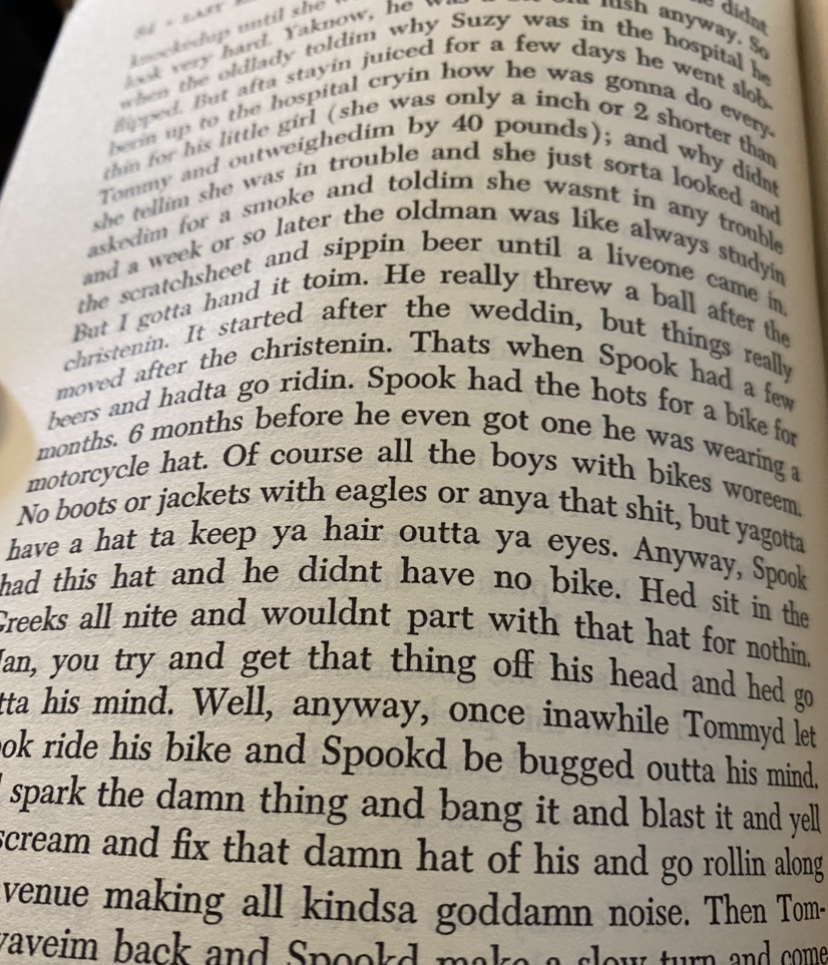Hubert Selby Jr. did not attend school past 15. As I wrote about in my previous essay, Selby had dropped out of high school in order to sail across the Atlantic and serve as a Merchant Marine. In order for Selby to become the writer he would evolve into, steps needed to be made to ensure that Selby could write the literature he wanted. That entailed adapting to his new profession, and in order to adapt, Selby would need to learn how to write from the ground up.
In some ways, it was beneficial. Outside of a traditional school structure, Selby was forced to learn how to write from other writers. That was enough for the young author to flourish, and it also allowed Selby to form his own syntax, or his own style, when it came to writing fiction.
Syntax, while important when drawing narratives, can also be limiting. When authors first begin writing, the rules of grammar can be daunting. There are resources that we can use today, such as The Elements of Style by E.B. White, but Selby was always someone who did things his own way. This can be found in how he joined the merchant seamen, as well as how he eventually ended up quitting narcotics later on in life. Things always had to be done on Cubby’s terms; nothing else would suffice.
Gilbert Sorrentino had a lasting impact on Cubby’s work at the time he was writing stories like The Queen is Dead, Tralala, and Home For Christmas. Sorrentino encouraged Selby to find his own voice and influenced Cubby’s writing in a way that few others could. Rather than try to conform Cubby to a traditional author, Selby was given an outlet in Nero, a literary magazine that Sorrentino edited. Selby found the freedom to create his own style was enough to keep him pushing on when trying to get his head wrapped around becoming a writer.
Considering the education level along with the ambition that Selby found inside of himself, it took years to get the first story out of his system. But, after the first one was done, Selby had found a style that he could work within. Rather than attempt to make his work look as polished as possible, he used the rules that he liked and discarded the ones that he felt were not needed. Things like quotation marks, indications that people are speaking, and apostrophes were all stripped away and replaced with items that Selby felt were better suited for his stories.
During interviews that were conducted for his documentary, It’ll Be Better Tomorrow, Selby explained that he felt that adding these elements to fiction was not needed. If one could express the dialogue of the people speaking well enough, then there wasn’t a reason to denote those events. Also, Selby wrote with a typewriter that required him to hold down the shift key in order to use an apostrophe, and in a dramatic fashion that only Cubby could display, he would state that the process of these additional steps was too much for him.
Selby would work around these annoyances and would construct his own syntax to build his stories. Selby wasn’t the only author to attempt to change his style in order to alter the way his work would be read. Cormac McCarthy would approach his fiction with a similar flavor. McCarthy would write The Orchard Keeper, his first novel, with no quotation marks and only rarely denoting when a character is speaking. Experimental fiction was becoming more popular through the fifties and the sixties due to the rise of postmodernism and other literary movements. Not all of those movements would originate in the states either.
Jean Genet is an author who Selby references in The Queen is Dead. Genet was a French author who wrote about topics like existentialism. Genet, Louis-Ferdinand Céline, and Jean-Paul Sartre were three French authors who had themselves pushed the genre of existentialism forward with their writing, and it’s clear that Selby had taken a liking to their styles even without the mentioning of Genet in his short story/chapter. Much of Selby’s work has to deal with the meaning behind life, and the futility of its different elements. The core tenement of existentialism is to attempt to find meaning and value in our own existence.
I find this was due to Selby facing death for a prolonged period during the early part of his life. When faced with multiple operations, much less ones intended to save your life, it can have a significant impact on your mental health. Not just that, but the medication that Cubby was forced to take in order to survive his bout with tuberculosis also impacted Selby’s mental health. One could look at the collection of events and see that those years spent in bed, wondering if he would live or die, would stay with Cubby for the rest of his days.
I also believe the drive to survive took hold of Selby’s writing as well. He wasn’t deterred when it came to expressing himself and how he felt. Though he was ill-equipped when it came to formulating stories with perfect grammar, he had already learned enough about life that he knew where his true strengths lie. As I wrote about before, Selby knew that his words could dictate how others felt. If he could master that, without focusing too hard on learning every rule of the English language, he could make himself into an amazing writer.
In the movie, It/ll Be Better Tomorrow, Selby speaks on his syntax and the reason he felt it necessary to change the way he wrote.
“As a reader, I can’t stand all this ‘he says, they said’. All these quotes and apostrophes. For… For one thing… Don’t. D-O-N-T. Now why in the name of Christ do you need an apostrophe? Don’t is dont, doesn’t is doesnt. You know, there are a few cases like I’ll, ill, you need something.”
Selby had a way of making his prose sound and feel like music more than it felt like fiction. It reads like poetry, where there is a certain beat to how everyone speaks. One of Selby’s main influences, when it came to writing, wasn’t another writer, but Beethoven. Beethoven was infamous for how he used repetition to enhance his symphonies. Selby would do the same with his writing, making sure to hammer home the themes that he was conveying to his readers.
In fact, Selby would keep the same central theme through Last Exit, as well as in his second book, The Room. That theme was the absence of love and of God. This is the reason behind the different Bible verses that can be found at the beginning of each chapter of Last Exit to Brooklyn. Selby is not just setting up the chapter ahead, but contrasting biblical verses alongside the scenes that he paints through his writing.
I think what’s important to note is that while Selby was criticized and chastised for his literary style, it actually brought him an audience that ended up preferring his experimental style over the more traditional one he used while writing The Demon. No matter what he did stylistically, there would always be detractors, but Selby persisted and made sure that he ultimately had the last word on what his writing looked and felt like.



